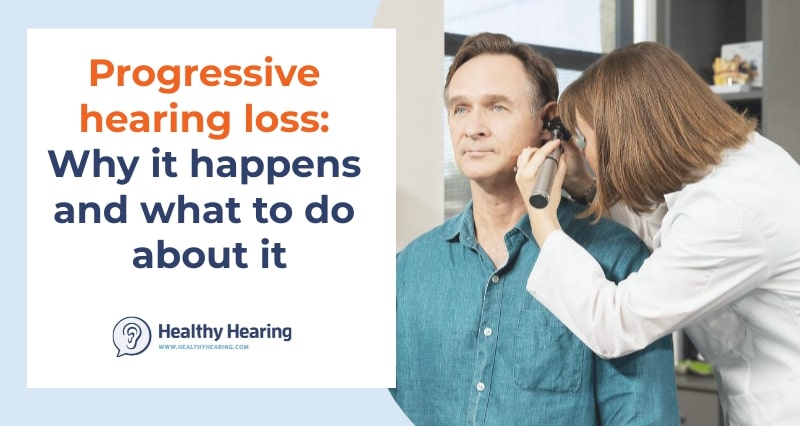|
www.HealthyHearing.com |
Progressive hearing lossWhen hearing loss gets worse with time
Contributed by Joy Victory, managing editor, Healthy Hearing Key points:
The human ear contains thousands of tiny sensory "hair" cells that detect sound waves. When these hair cells are damaged or destroyed, hearing loss is the result. Many different things can cause this damage—not just loud sounds, but also certain medications, diseases, and conditions. Often, the damage is progressive, meaning it gets worse over time, slowly but surely, as the hair cells degrade and die. While this type of hearing loss is not curable, hearing aids can help most people with progressive hearing loss. Which kinds of hearing loss get worse over time?Age-related hearing lossAge-related hearing loss is a type of sensorineural hearing loss, meaning there is damage or degradation to the tiny cells within the inner ear. These cells are sensory cells responsible for detecting sound waves. With sensorineural hearing loss, your inner ear, auditory nerve, or both are damaged, usually permanently. It does tend to get worse over time. Scientists think most age-related hearing loss is related to noise exposure over many years. 
“Much of the hearing loss called presbycusis is likely primarily noise-induced,” says retired audiologist Jan Mayes. Research indicates that residents of communities with little noise in their environment “show normal hearing thresholds into their older years,” she adds. In addition, health problems that are more common in older adults may affect hearing, such as diabetes, high blood pressure, and a heart condition or stroke. Noise-induced hearing lossWhile it can take decades for hearing loss to become noticeable, the damage likely starts in young adulthood. About a quarter of American adults age 20 to 69 have noise-induced hearing loss. While occupational hearing loss is common, more than half of them didn’t suffer hearing damage on the job. Instead, damage can be due to playing music too loudly, attending concerts or sports events, shooting firearms, or running power tools and landscape maintenance equipment. The more loud noises you hear, the more damage, so this kind of loss builds up over time. Medication side effectsMedications can damage the inner ear, sometimes permanently. Before stopping or starting any new medication, talk to your doctor. Even common OTC pain medications can cause hearing loss. Genetic conditionsA number of inheritable genetic conditions can cause progressive hearing loss, such as Usher syndrome. Many of these start in childhood, but some may not surface until adolescence or adulthood. Meniere's diseaseMeniere's disease usually only affects one ear, and can cause fluctuating and/or progressive hearing loss. It is related to inflammation and fluid within the inner ear. Autoimmune diseasesA number of autoimmune diseases can cause progressive hearing loss, including autoimmune inner ear disorder, hypothyroidism, rheumatoid arthritis, and lupus. What kind of hearing loss isn't progressive?Conductive hearing loss is generally not progressive, as it is a type of hearing loss that usually can be corrected with medical treatment or surgery. It occurs when sound waves cannot reach the inner ear because of some sort of obstruction, such as earwax, infection, anatomical problems like otosclerosis, or a punctured eardrum. Will hearing aids slow down hearing loss?Hearing aids cannot prevent future hearing loss. But they do something else that's important: They keep your brain stimulated with auditory signals, improving brain health. When hearing loss goes untreated, parts of the brain that process sound literally shrink, known as brain atrophy. This means you need to wear your hearing aids regularly. Your hearing may still worsen over time, but regular check-ups with your hearing specialist will ensure your hearing aids are programmed correctly. Protect your remaining hearing as much as you canIf you already have hearing loss, it's important to protect the residual hearing you have left. This will at least slow the progression of hearing loss. It's fairly simple: Avoid loud sounds as much as you can. And if you can't, wear earplugs or earmuffs. What can I do if my hearing gets really bad?If your hearing loss becomes severe or profound, be reassured that there are “power” or “super power” hearing aids available. Other options are a bone-anchored system or a cochlear implant, which can be used in people of all ages, including seniors. Sudden hearing loss? See a doctor ASAPIf you experience a sudden hearing loss—all at once or within a few days—seek medical care immediately. This kind of change is not "progressive" like the hearing loss causes mentioned above. It is rapid, and it typically occurs in only one ear. Prompt treatment is important for preserving hearing. Getting help for progressive hearing lossHearing instrument specialists and audiologists are trained and licensed to detect and treat hearing loss with hearing aids or other devices. Find a qualified provider near you with our extensive directory of consumer-reviewed hearing loss clinics. Joy Victory, managing editor, Healthy Hearing
Related Help Pages:
Hearing loss Prevention Children's hearing loss Hearing aids Cochlear implants Meniere's disease
|
Featured clinics near me
Earzlink Hearing Care - Reynoldsburg
7668 Slate Ridge Blvd
Reynoldsburg, OH 43068

Find a clinic
We have more hearing clinic reviews than any other site!


 Joy Victory has extensive experience editing consumer health information. Her training in particular has focused on how to best communicate evidence-based medical guidelines and clinical trial results to the public. She strives to make health content accurate, accessible and engaging to the public.
Joy Victory has extensive experience editing consumer health information. Her training in particular has focused on how to best communicate evidence-based medical guidelines and clinical trial results to the public. She strives to make health content accurate, accessible and engaging to the public.